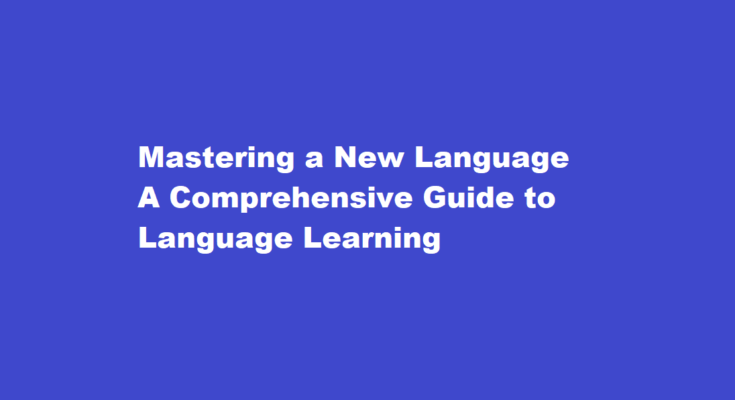Introduction
Learning a new language opens up a world of opportunities, allowing you to connect with diverse cultures, boost cognitive abilities, and enhance career prospects. While the process might seem daunting, with the right approach and dedication, anyone can embark on this enriching journey. In this article, we will explore a step-by-step guide on how to learn a new language effectively.
Set Clear Goals
Before diving into language learning, define your objectives. Are you learning for travel, work, or personal growth? Set specific, achievable goals to maintain focus and motivation throughout your journey.
Choose the Right Language
Selecting a language aligned with your interests and future plans is crucial. Research the popularity, usefulness, and relevance of the language to ensure you make an informed decision.
Immerse Yourself
Immerse yourself in the language and culture through movies, music, books, and online content. This exposure will familiarize you with the language’s sounds, intonation, and colloquialisms, making it easier to pick up conversational skills.
Start with Basic Phrases and Vocabulary
Begin by learning essential phrases and common vocabulary. Mastering everyday expressions will enable you to engage in simple conversations and build your confidence from the start.
Utilize Language Learning Apps
Language learning apps like Duolingo, Rosetta Stone, or Babbel offer interactive lessons, quizzes, and gamified learning experiences. These apps provide structured learning paths and progress tracking to help you stay on track.
Grammar and Sentence Structure
While memorizing vocabulary is essential, understanding grammar and sentence structure is equally crucial. Dedicate time to grasp the fundamental rules of the language, as they form the foundation for effective communication.
Practice Speaking Regularly
Speaking is an integral part of language learning. Find language exchange partners, join language meetups, or practice with native speakers online. Embrace opportunities to speak and receive feedback on your pronunciation and usage.
Listen and Repeat
Listen to podcasts, radio stations, or audiobooks in your target language. Repeat phrases, paying attention to pronunciation and intonation. This will improve your listening skills and help you internalize the language’s natural rhythm.
Read Regularly
Reading books, articles, and news in your chosen language enhances vocabulary and comprehension. Start with children’s books and gradually progress to more complex materials as your language skills improve.
Write, Write, Write
Keep a language journal or start a blog to practice writing. Express your thoughts, experiences, and observations in the target language. Writing regularly will reinforce your understanding of grammar and expand your vocabulary.
Use Flashcards
Flashcards are a powerful tool for memorizing new words and phrases. Write the word in your target language on one side and its translation on the other. Review them daily to reinforce your memory.
Be Consistent
Consistency is key to language learning success. Dedicate a specific amount of time each day to practice, even if it’s just 15 minutes. Regular practice is more effective than sporadic, intensive study sessions.
Embrace Mistakes
Mistakes are a natural part of the learning process. Don’t be afraid to make them; they are opportunities for growth. Native speakers will appreciate your efforts to communicate and will likely offer helpful corrections.
Stay Motivated
Motivation can wane over time, especially when progress seems slow. Set milestones and reward yourself for reaching them. Surround yourself with positive influences and remind yourself of the reasons you started this journey.
Travel to a Country Where the Language Is Spoken
If possible, immerse yourself in a country where the language is spoken. This real-life exposure will accelerate your learning and provide invaluable cultural experiences.
FREQUENTLY ASKED QUESTIONS
Is it easy to learn Korean?
The FSI puts Korean as a Category V language. Which means, it’s one of the hardest languages to master. They estimate 2200 hours of study before you can reach fluency in Korean.
What is the best age to learn a language?
The most recent major study on language learning and age was conducted by researchers at Harvard and MIT. It concluded that starting to learn a new language before age 10 will give a learner the best chance of achieving proficiency similar to that of a native speaker.
Conclusion
Learning a new language is a rewarding endeavor that enriches your life in countless ways. By setting clear goals, immersing yourself in the language, and maintaining consistency, you can master a new language with determination and perseverance. Embrace the challenges, celebrate the progress, and open the doors to a world of new possibilities. Happy language learning!
Read Also : A Step-by-Step Guide to Changing Your Car’s Oil Keeping Your Engine Running Smoothly



